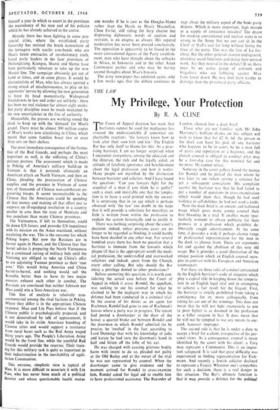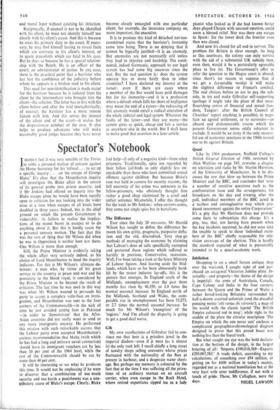My Privilege, Your Protection
THE LAW
By R. A. CLINE
rrHE Court of Appeal decision last week that I barristers cannot be sued for negligence has aroused the understandable if somewhat un- charitable reaction: 'the lawyers know how to look after their own kith and kin.' The English Bar has only itself to blame for this. As a prac- tising barrister, I am no longer surprised when I encounter everywhere, among the educated and the illiterate, the rich and the legally aided, an attitude of fatalistic ignorance and bewilderment about the legal profession and how it works. Many people are mystified by the distinction between barrister and solicitor. And I have found the question: 'Can you lawyers fight for the acquittal of a man if you think he is guilty?' such a stock and inevitable one that the tempta- tion is to have a card printed with the answer. It is surprising that in an age which is perhaps obsessed with 'the law' (no doubt in the hope that it will provide a substitute for morality), so little is written from within the profession to explain the system historically and to justify it.
There was nothing surprising about the court's decision; indeed, unless previous cases are no longer to be regarded as binding, it could hardly have been decided in any other way. For several hundred years there has been no question that a barrister is immune from the lawsuits which plague (if that is the appropriate word) the medi- cal profession, the understaffed and overworked solicitors and indeed, apart from the Church, every other calling. But why should the Bar enjoy a privilege denied to other professions?
Before answering this question, it is worth con- sidering the actual case before the Court of Appeal• in which it arose. Rondel, the appellant, was seeking to sue his counsel for what he claimed to be the negligent way in which his defence had been conducted in a criminal trial. In the course of his duties as an agent for Rachman, Rondel had gone to one of Rachman's houses where a party was in progress. The tenant had posted a doorkeeper at the door of the house; a quarrel broke out between Rondel and the doorman in which Rondel admitted (to be precise, he 'exulted' in the fact according to Lord Denning) that with his knowledge of judo and karate he had torn the doorman's hand in half and bitten off the lobe of his ear.
He was charged with causing grievous bodily harm with intent to do so, pleaded not guilty at the Old Bailey and at the outset of the trial he was not represented by counsel. When the doorkeeper came to give evidence and the moment arrived for Rondel to cross-examine him, Rondel asked for legal aid to enable him to have professional assistance. The Recorder of London allowed him a dock brief.
Those who are not familiar with Mr John Mortimer's brilliant drama on this subject will wish to know that for £2 4s. (d. the person in the dock can have his pick of any barrister who happens to be in court, be he a man full of years and reputation or a beginner, and the chosen counsel is obliged to conduct what may be a four-day case for this nominal fee and no more. He cannot refuse.
Someone in the court gallery found the money for Rondel and he picked the man whom he was later to sue (when serving a sentence for yet a subsequent conviction). His complaint against the barrister was that he had failed to put a number of questions in cross-examination which would show that, though he had used violence in self-defence, he had not used a knife. Now the dock brief is an ancient and hallowed usage which gives many young counsel their first blooding in a trial. It enables many (par- ticularly women) to obtain publicity for their prowess in a profession which prohibits de- liberately sought advertisement. At the same time, it provides a wide if perhaps chancy range of professional representation for the man in the dock to choose from. There are arguments for and against the abolition of this very old usage. But it provides a good illustration of the unique position which an English counsel occu- pies in contrast with his European and American counterpart.
For there are three rules of conduct entrenched in the English barrister's code of etiquette which
play a capital role in keeping down the tempera- ture in an English legal trial and in attempting to achieve a fair result for the litigant. First, the barrister is strictly prohibited from taking a contingency fee or. more colloquially, from taking his cut out of the winnings. This does not
mean that he will not fight strenuously to win (a poor fighter is as doomed in the profession as a killer surgeon in his). It does mean that he will not be tempted to use any means to suc- ceed, however improper.
The second rule is that he is under a duty to accept a brief for a client, irrespective of his per- sonal views. As a consequence, counsel is never identified by the court with his client; a Tory may represent a Communist. This is an impor- tant safeguard. It is said that great difficulty was experienced in finding representation for Eich- mann. And recently a Jewish solicitor declined to represent a Fascist. Whatever one's sympathies for such a decision, there is a real danger in this situation. The Bar's ultimate function is that it may provide a defence for the political and moral leper without catching his infection.
Reciprocally, if counsel is not to be identified with his client, he must not identify himself too closely with his client's cause. And this is because he owes his primary duty to the court. If neces- sary, he may find himself having to reveal facts which are contrary to his client's interest, or to quote precedents which are fatal to his case. But he does so because he has a special relation- ship with the Bench. He is an officer of the court, an administrator of justice. In any case, there is the practical point that a barrister who has lost the confidence of the judiciary before whom he appears is a broken reed to his client.
This need for non-identification is made easier for the barrister because he is isolated from his client by the intermediary who brought him the client—the solicitor. The latter has to live with his client before and after the trial (metaphorically, of course); the barrister has a more remote liaison with him. And this serves the interest of the client and of the court—it makes for the dispassionate conduct of the case. It also helps to produce advocates who will make reasonably good judges because they have never become closely entangled with one particular client; for example, the insurance company or, more important, the executive.
It is to produce this kind of detached not-too- committed status that the barrister's immunity came into being. There is no denying that it cannot be logically justified—it is an anomaly. But anomalies are not necessarily evil unless they lead to injustice and hardship. The conti- nental, indeed Germanic, approach to our legal system has had some big successes since the war. But the real question is : does the system operate less or more fairly than in other countries? I have declared my interest at the outset: even if there are cases where a member of the Bar would have paid damages but for his immunity—and it is a profession where a default which falls far short of negligence may mean the end of a career—the redressing of this anomaly would entail a radical alteration of the whole judicial and legal system. Whatever the faults of the latter—and they are many—the system gives as quick, cheap and fair a service as anywhere else in the world. But I shall have to make good that assertion in a later article.







































 Previous page
Previous page